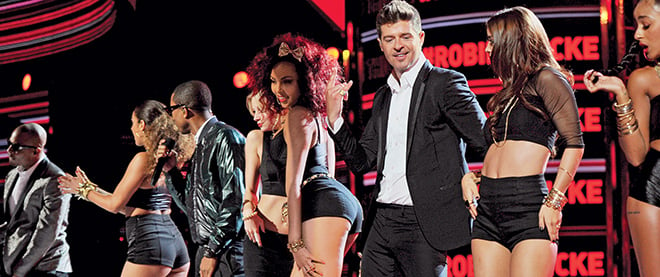Blurred Lines of rape and relativism
Robin Thicke’s summer hit is under fire for misogyny, while many hip-hop artists get a free pass
Kevin Mazur / BET / Getty Images
Share

The music video for Canadian-American pop star Robin Thicke’s summer hit, Blurred Lines, in which the fully attired singer makes advances toward a group of topless, prancing supermodels, is not a feminist fan favourite. Neither are the song’s lyrics: “I hate these blurred lines / I know you want it / the way you grab me / must wanna get nasty.” Critics have denounced the song as “rapey.” Here’s Elizabeth Plank, taking Thicke down on PolicyMic: “The idea that consent is a ‘blurry’ concept is deeply ingrained in the way sexual assault is represented in the media, our culture, and, yes, our judicial system. It’s what drives many to doubt the veracity of rape allegations.”
Since the song’s release this summer, a number of online parodies have emerged challenging Thicke’s supposedly warped version of sexual consent. One especially earnest rendition, out of Halifax, stars a group of women delivering a markedly different message to the tune of Blurred Lines: “Ask first / No way to know I want it / Unless I say I want it / Consent is sexy / Shows you respect me.”
Thicke, meanwhile, has denied any wrongdoing. He stated, bizarrely, this month that the song is actually a “feminist movement within itself,” and that he does not, he insists, condone sexual assault. Neither, apparently, does Justin Timberlake. The former ’NSync leading man is making his own apology tour for his clubbing anthem Take Back the Night—no, it is not an ode to the international anti-rape movement of the same name—after organizers spoke out against his misappropriation of their name and message.
That Thicke cared enough to address the backlash is surely a victory for the feminist YouTube parody movement. But if calling out misogyny in pop culture is their mission, they have all but abandoned it. The truth is, there is an entire genre of music—arguably the most popular on this continent—that is at once rife with misogyny and free from criticism. I’m talking about hip hop.
Robin Thicke’s song may very well flirt with rape, but many rappers have received zero flack for openly endorsing it. If you’re going to fault a guy for the vague insinuation that getting explicit sexual consent is, maybe, kind of a bummer, shouldn’t you also fault someone for rapping this (the words of indie darling Earl Sweatshirt): “Her body is a temple / I don’t give a f–k / I’m atheist / Make me stop / Make me, bitch.” Aside from the public scolding of American rapper Rick Ross earlier this year (Ross rapped about date-raping a woman), and the occasional chiding of Kanye West or Lil Wayne, casual misogyny in hip hop goes largely unnoticed in the mainstream. If pop-culture feminists really took it to task, we’d hear about it every day.
How to explain this double standard? The most obvious difference between the artists currently on trial for misogyny and the ones who are not (the majority of rappers in North America) is that Robin Thicke and Justin Timberlake are white and, unlike many rappers, they do not write songs about racism and poverty. Their objectification of women doesn’t come with a side of social commentary about gun violence.
Consider the triumph of Three 6 Mafia, the rap ensemble that won an Academy Award in 2005, to little protest, for their outrageously sexist song It’s Hard Out Here for a Pimp. Embedded in the lyrics are two themes: treating women like chattel, and the hardships of poverty. Somehow the latter made the former less repugnant. When an artist has been oppressed in some way himself, he is, by modern liberal criticism’s standards, free to oppress others.
Eminem, who’s white and, conveniently, the only mainstream rapper to incur the wrath his contemporaries avoided, made this argument long ago, in rhyme: “So now I’m catchin’ the flak from these activists when they raggin’ / Actin’ like I’m the first rapper to smack a bitch.”
Let’s face it: Dousing everyone’s Top-40 fun in a frigid shower of women’s-studies truisms does not a good time make. But anyone whose calling it is to expose the moral failings of others should be consistent. You can’t oppose “blurred lines” in one world and ignore lines crossed violently in another.
Have a comment to share? [email protected]